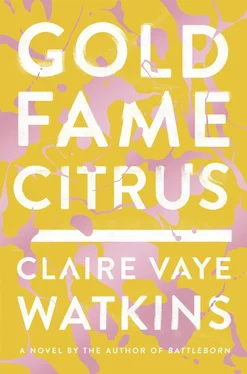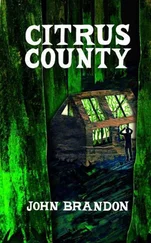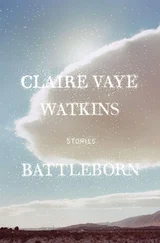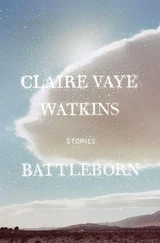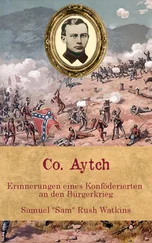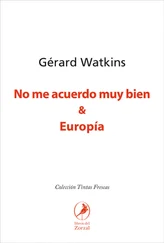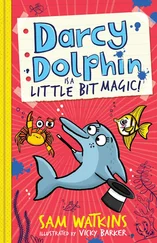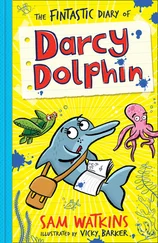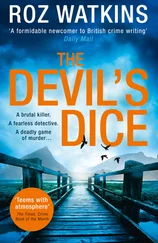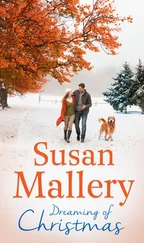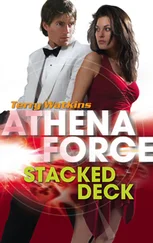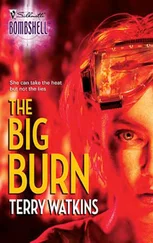“That color,” said Luz. “Look at the color, Ig.”
“Ig, Ig, Ig,” said Ig.
“Mine tailings,” said Ray. “Sulfur.”
In the sulfur pools squatted slick, bulbous mineral hives, steam surging from their slit openings like eyeless worms surfacing, belching mustard gas into the air. The thick rankness carried Luz to her father’s living room, where she was drinking a smoothie made from fruit powder — some powder was caked at the bottom and if she put her straw too deep she’d sip up a mealy mouthful. Her father with a bolo tie and too much skin for his face held a glowy yellow specimen in his palm and said to a room of grown-ups, This is Satan’s little stocking stuffer. This is how he tells you he’s a-coming.
“Brimstone,” Luz said to Ray. Together they knew the names of everything.
The Melon lurched once, twice; something knocked around inside, then stopped. And then, casually, as if it weren’t pinpointing the specific patch in a field of poison where they would die of thirst, the car began its final, quiet, excruciating coast.
Ray got out. Luz did too, as if there were something to be done. Ig whined after them and Luz climbed into the backseat to free her. From there she heard it, a sharp, wet bark, then another. She started and looked through the filthy windshield to Ray, pacing up and down the trail, his long legs stabbing berserkly away from the car and back again, his body atop them a live wire, convulsing, seizing, his hands clawing at his red face, wet somehow. (Spit, tears.) He screamed again, a pinched shriek like a mutt beneath a car and with it more spittle flinging from his lips, and then again, this sound slower, seeming to come from deep within him, a tremor traveling up his racked torso and bursting from his mouth. His feet skidded from beneath him and he collapsed on his back in the dirt. He lay there, trembling. The man with the specimen would have called it a possession, and Luz would have, too. A possession by rage and fear and profound, unyielding despair at this most inarguable failure.
Ig was still in her seat, silently shaken. Then she began to cry. Luz lifted her, jouncing and cooing, and walked with her away from where Ray lay in the dirt, his chest heaving, making scary murmuring sounds. Ig wanted down, then wanted to face-plant into the lovely toxic shore beyond the trail, so Luz squatted down and wrapped her arms around her. The child leaned into the hug, and what a tremendous satiating feeling that was, better than clean water.
When they returned Ray had collected himself, risen from the ground and was now leaning against the open trunk, folding the gasoline-soaked clothes. “Did she pee?” he asked.
Luz lifted Ig and sniffed her rump. “She’s good,” she said. “She wants you.” But Ray went on, folding the gas-smelling clothes. Making piles. When the clothes were folded and sorted he lifted Lewis and Clark and Sacajawea and Francis Newlands and William Mulholland and John Wesley Powell from the starlet’s leather satchel and stacked them beside the clothes. He would not look at them. Luz was beginning to think she’d never known this man and never would.
“Is this clean?” he asked, holding a supersaturated cobalt scarf with golden links of illustrated chain strung across it.
“What are you doing?”
He had a project, a plan. He tied the scarf loosely around his neck. He put his half-full jug in the satchel, and a dirty T-shirt and three cans of tuna.
“What are you doing?” Luz said again, though she knew now. “Stop it.”
“Come here,” he said to Ig, and she did. He held her and squeezed her and she let him. He kissed Ig on her head. Again and again he kissed her. Luz wished he would stop, and that he would never stop. He tried to pass the child to Luz, but she refused.
“I don’t want you to go,” she said.
“It’s gonna be fine. I’m just going to get help.”
“Where?”
He kissed Ig again. It was horrid, his lips hesitating on her feather-soft hair the worst of omens. “It’s gonna be fine,” he said again, though it would not. “I’m just going to go ahead to a road and find someone, get some gas and get us out of here.”
“There’s nothing out there, Ray.”
To Ig, with his high, soft Ig voice, he said, “I’m going for a walk now. Just a little walk down the road here.”
Ig said, “Road here.”
“That’s right,” he said, passing the child to Luz. “Go to Mama.”
Luz took the girl on her hip.
Ray fastened the satchel. He was doing penance for the AWOL thing. He was going to leave her alone to watch their child die, to prove what a good man he was.
“We’ll go with you,” she said.
Ray stroked Ig’s head. “It’s not safe. She needs shade. Water. We can’t carry enough.” He let Ig make a fist around his index finger. “She’s too delicate. She’d slow us down.” It was unclear whom he was talking to.
Ray kissed Luz then, kissed her as if he were embarking on his morning commute, as if he were the manager at one of the burnt-out banks along Wilshire. “Please,” said Luz. “No.”
“Listen,” he said, trying words on the wordless. “I don’t… You won’t… I’m sorry. It’s just…” He squeezed Ig’s calf and shouldered the satchel. “Get her out of the sun, okay?”
“Please no. Please! I can’t do this by myself.” She wanted him to say, Sure you can. He used to be so good about saying what she needed to hear.
“You don’t have to,” he said.
“No,” she said.
“I’ll be right back.”
“Take more water at least,” she said through a thick sob. “Fill your jug.” She reached for the Sparkletts barrel, nearly full of water, and tugged it to the edge of the trunk. Then, epiphany.
She could not lift the barrel with Ig in her arms, and everywhere there was to put her was scalding or venomous or glistening with gasoline. She pried the plastic cap off with her free hand, saw herself tipping the whole heavy, sloshing aqua of it, spilling the only water they had onto the dry crust of the trail. Water came in three lethargic glug s, instant mud spattering against her ankles.
“Don’t,” cried Ray, righting the bottle. He grasped her wrist and pried the plastic cap from her hand. He shoved the cap back on the barrel. Between them the water disappeared into the ground. Whispering now, he said, “Don’t you fucking dream of it.”
She might have tried again — wanted badly to, wanted badly to be capable of that. She wanted worst of all to press a cold pint glass against his neck and ask him if he remembered his longboard, the two of them leaning back and riding it down Canyon Drive. Ask him to help her once more onto the handlebars of his liberated mountain bike and ride them both down the center of PCH, helixing through rivulets of melty tar, him swerving, putting little phantoms in her heart, so that he could whisper I got you .
Ray tugged the scarf up over his mouth and nose. Against the infinite cobalt of the silk his eyes were colorless, clear, already gone. “Don’t cry,” he said. “I’ll be right back,” he said, though he would not.
—
The light went on forever out here, and so it was a long, long time before he disappeared. “Where him go?” Ig asked a few times, dry-eyed. Luz was the only one weeping.
“To get help.”
“Elp?”
“Help.”
Horse and wagon part.
Luz knew enough to stay in one place. That was the thing lost people never did but she would do and they would be rescued because of it. “It has nothing to do with inertia or helplessness,” she told Ig. “Or fear.” And to prove it she took the girl on slow walks in one of two directions: back, in the wake of the Melon, the way Ray’d gone, or forward. They paced the trail so ceaselessly and so slowly — Ig was ever distracted by a clod or a rock — that Luz might have forgotten which way was which if not for the Melon gazing blankly ahead. As they walked Luz watched the horizon, too, watched it until it went meaningless, until she could no longer distinguish the valley floor from the dune field marching across it, nor the smeary peaks of the dunes from the white sky. At home base — this she called it for Ig’s sake, somehow — she thought to pinch the starlet’s clothes in the rolled-up windows, but even in the shade the car became an oven, so she rolled them down again.
Читать дальше
